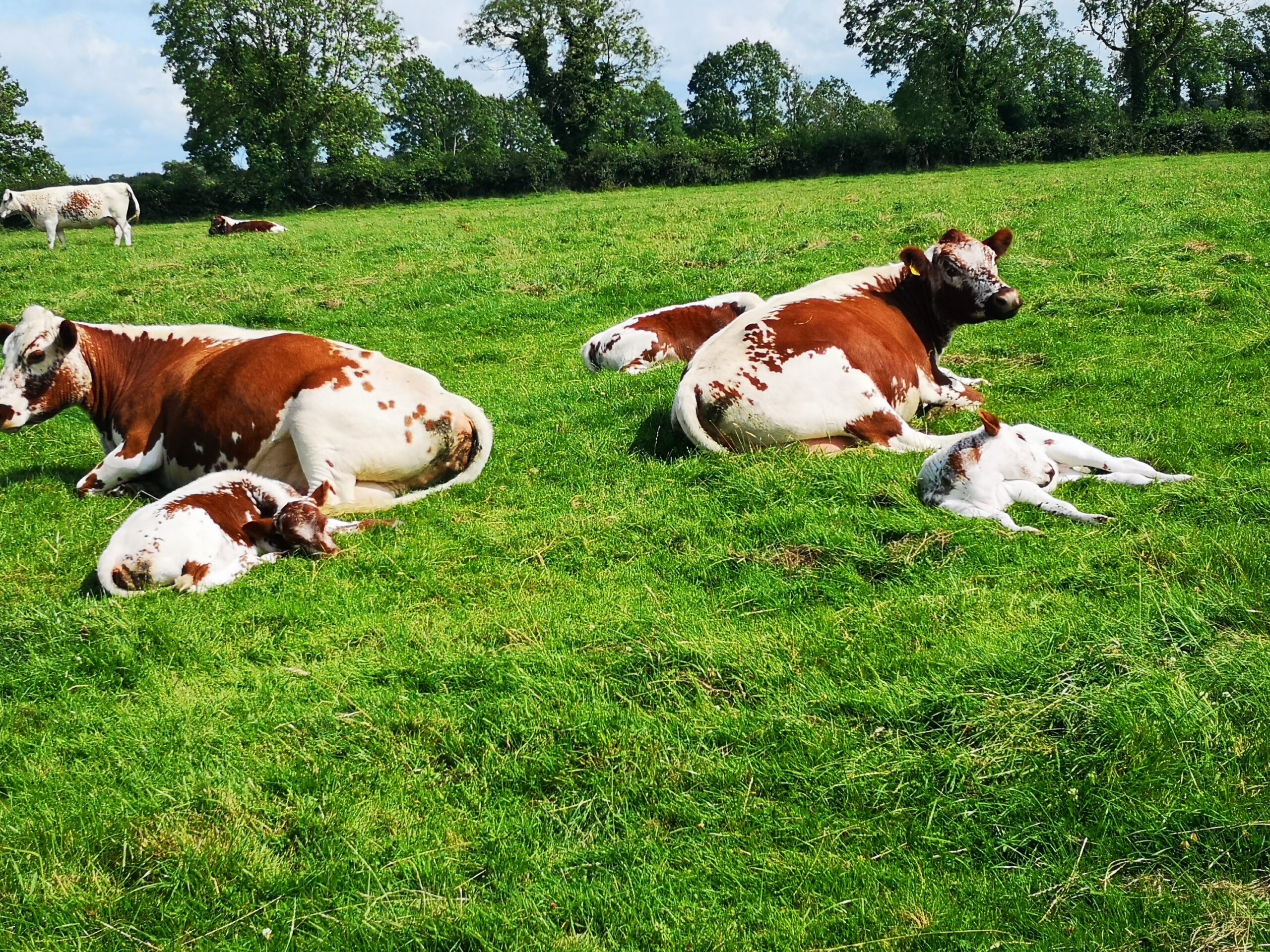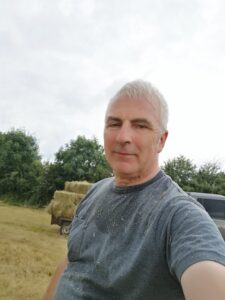Leitrim Organic Farmers’ Co-op

An organic selling cooperative in Ireland that has expanded to include training, agricultural advice, activism and influencing policy.
Key words: organic agriculture, biodiversity, livestock, quality livestock products, authentic, cooperative, ethical
Short description
Name of the initiative? Leitrim Organic Farmers’ Co-op
Country Republic of Ireland
Region North West
What kind of initiative Farming/production, education/training, marketing, biodiversity, policy making
The Story
This cooperative came together in 1998 because we had many new organic producers with no route to market. I was involved in marketing in the IT sector and I was also still farming. In 2001, one of the guys in the newly formed co-op said, ‘We need a manager, will you do it?’
“…I thought well, I’m kind of bored with what I’m doing, so I said, ‘Yes. I’ll give it a go and see what happens.’”
And I thought well, I’m kind of bored with what I’m doing, so I said, ‘Yes. I’ll give it a go and see what happens.’ I had to set up the infrastructure of offices. I also had to look for funding and I had to set out a programme for how the cooperative would develop and what it would do.
We’re in an area of Ireland which is quite rural and poor because the land is poor quality, there are small scale farms and difficult soils. The challenges were really big, but the main goal was that we could find outlets for our organic produce. I developed markets in different ways. I looked first of all at the kind of produce we had locally: the meat, the beef, the vegetables, etc. We set up one of the first Farmers’ markets in the country and that’s still going. It’s very successful.
” I looked first of all at the kind of produce we had locally: the meat, the beef, the vegetables, etc. We set up one of the first Farmers’ markets in the country and that’s still going.”
We also collaborated with larger processors. We worked with them to supply products outside of Ireland – in the Netherlands and the UK. And those contracts are still in place today.
We then devised educational programmes for our members. At that time there was no place you could go for education on organic systems. We found streams of funding that run year on year to allow organic producers to be trained in a whole range of things from food safety to growing techniques to biological farming techniques to agroforestry. It’s all demand-driven, driven by the farmers and producers themselves.
“…we have been a catalyst for many other activities and organisations that have sprung up in our area.”
The cooperative has now spawned other initiatives such as a training company. It’s even spawned a training company in the hair and beauty sector! So we have been a catalyst for many other activities and organisations that have sprung up in our area. We go to farmers because we are agricultural advisors and we help them to deal with the bureaucracy with the EU programmes. We encourage them to look at things like Ecotourism.
“I could have earned more money in IT, but it was about something bigger.”
It’s hard to survive financially, to pay staff, recruit members, develop markets and outlets, to produce newsletters. As well as the logistical challenges there were some personality clashes and in 2005 the Co-op almost collapsed. It’s not easy. I could have earned more money in IT, but it was about something bigger. I was able to reconnect with the things that are important: the land and the community.
“It’s really important to connect with the local community and have their support. We have survived because of the good will towards the Co-op. People feel they are part of something.”
It’s really important to connect with the local community and have their support. We have survived because of the good will towards the Co-op. People feel they are part of something. We’ve been able to reduce rural isolation because we run discussion groups and events improving social interaction.
Social farming has also developed in our region, mainly because of our influence. Social farming is where you take people with special needs; they may be drug abusers, they may be autistic, or have some other problems, maybe some form of mental illness that they’re recovering from. The farm is used in a holistic way of dealing with the traumas and difficulties in their lives. So the farmer takes in one or two people two or three days a week. Those people will work alongside the farmer and the farmer gets a small amount of money as great satisfaction from dealing with these people and seeing improvements in their wellbeing.
“I see small farmers as the threads that hold everything together.”
At different stages we’ve been involved in work at European level, trying to formulate new policies especially through the Common Agricultual Policy (CAP) to make it more reflective of our own ambitions. I want to get Ireland and all European small farmers onto the agenda, to make sure we’re not overlooked. I see small farmers as the threads that hold everything together. They keep everything going in the countryside. They are the bedrock of the countryside. They provide the food for locals, but they also provide the food for visitors. They add to the biodiversity. They provide all sorts of public goods and that needs to be recognised fully within the CAP. We need to see the positive contribution they are making environmentally – they’re not the ones that are damaging the water systems and farming inappropriately – they are the custodians of the countryside.
We’ve seen a reduction of 50% in dairy farmers in many countries. We cannot let that continue to fall. We must try to reach a stage where farmers are seen as a protected species – almost a little like rare breeds, we’ve gone down to so many. If we let numbers fall further, they might disappear.
“We must try to reach a stage where farmers are seen as a protected species – almost a little like rare breeds, we’ve gone down to so many. If we let numbers fall further, they might disappear.”
We have to also correlate that reduction in farming numbers with the reduction and in some cases the collapse of biodiversity. The mixed small farms that have been the tradition across Europe cultivated interdependencies, not just between animals and plants, but between insects and animals and plants. So those things, once they’re gone, may be very very difficult to reestablish. I think the small farming traditions of Europe should be enshrined in law, so there is a legal definition of those people, rather than seen as marginal and in the way of agribusiness.
” I think the small farming traditions of Europe should be enshrined in law…”
They are in the way of agribusiness because agribusiness just wants to have three or four large farms and clear everything else off.
“You cannot be an organic farmer and not be an activist, because virtually everything you see around you is attacking your environment and the space in which you want to produce food.”
You cannot be an organic farmer and not be an activist, because virtually everything you see around you is attacking your environment and the space in which you want to produce food. So we were involved in the anti-fracking campaign along with other community groups. We did practical things, showing if you have fracking, you can’t have farming. We brought groups onto the farms and explained how the whole process worked. We educated ourselves so that we could educate the public.
We have another campaign to stop the rise of monoculture conifer plantations, because the land has been sold to international outside interests such as pension firms. Small farmers don’t have an opportunity to purchase this land. The type of forestry is acidic, bad for biodiversity, bad socially because it darkens off the countryside and people who live close to them suffer from various psychological problems. We’re going to win. We will win because we will keep going and keep attacking the Irish Forestry Policy, using all the European Laws and the Arras Convention. That unique piece of legislation has really empowered small local communities like ours.
” I take great hope when I come and meet similar people dealing with the same challenges here in Europe.”
I’m a committed European despite its flaws. I take great hope when I come and meet similar people dealing with the same challenges here in Europe. I think ECVC (European Coordination Via Campesina) is a great way of channeling energy for a positive outcome for small farmers.
” I looked first of all at the kind of produce we had locally: the meat, the beef, the vegetables, etc. We set up one of the first Farmers’ markets in the country and that’s still going.”
“…we have been a catalyst for many other activities and organisations that have sprung up in our area.”
“I could have earned more money in IT, but it was about something bigger.”
“It’s really important to connect with the local community and have their support. We have survived because of the good will towards the Co-op. People feel they are part of something.”
“I see small farmers as the threads that hold everything together.”
“We must try to reach a stage where farmers are seen as a protected species – almost a little like rare breeds, we’ve gone down to so many. If we let numbers fall further, they might disappear.”
” I think the small farming traditions of Europe should be enshrined in law…”
“You cannot be an organic farmer and not be an activist, because virtually everything you see around you is attacking your environment and the space in which you want to produce food.”
” I take great hope when I come and meet similar people dealing with the same challenges here in Europe.”
Additional information
http://www.leitrimorganic.com/
—
Repository compiled in April 2020 by: John Brennan
E-mail contact: johnb@leitrimorganic.com

